Yielding profound insights, Biblical prayers for Israel reveal timeless wisdom on faith and divine guidance—discover why they still resonate today.
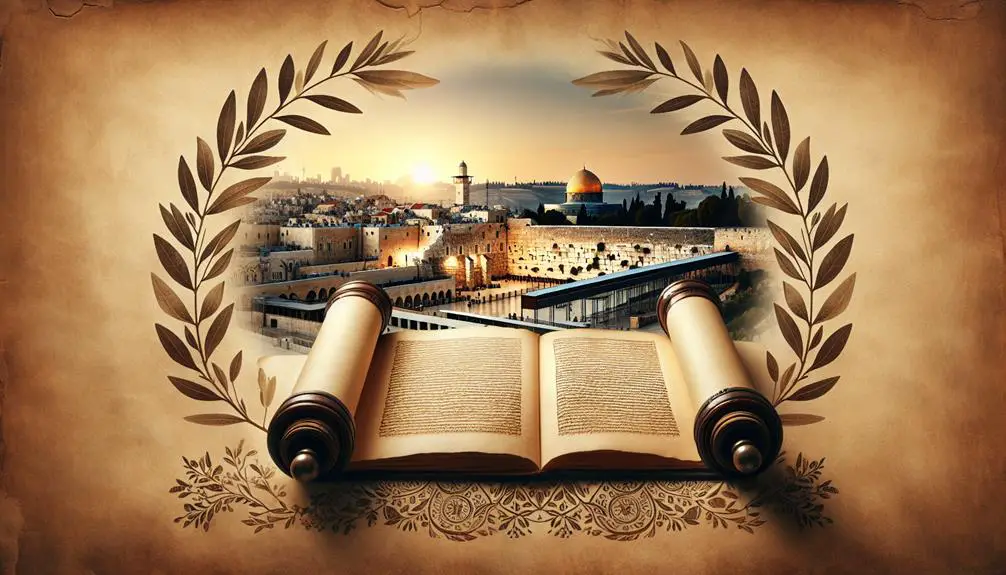
Prayer for Israel in the Bible
In the biblical era, without the convenience of smartphones to instantly connect, the patriarchs, prophets, and kings had a direct line to God through prayer, especially when it came to the welfare of Israel. You'll find that these prayers, ranging from Abraham's intercessions to Nehemiah's cry for restoration, aren't just ancient texts but are filled with lessons and insights that are surprisingly relevant today.
As you explore these heartfelt pleas, you'll uncover a rich tapestry of faith, hope, and divine intervention that still speaks to the challenges and aspirations of modern believers.
So, why is this ancient practice so pivotal in the life of a nation and its people?
Key Takeaways
- Prayer in the Bible is multifaceted, encompassing intercession, negotiation, and personal transformation.
- Biblical figures like Moses, David, and Solomon model a deep, personal engagement with the divine through prayer.
- The prophets' pleas and intercessions highlight a theology of mercy, emphasizing compassion over judgment.
- Prayer for Israel often reflects a collective desire for divine guidance, protection, and presence within the community.
The Patriarchs' Intercessions
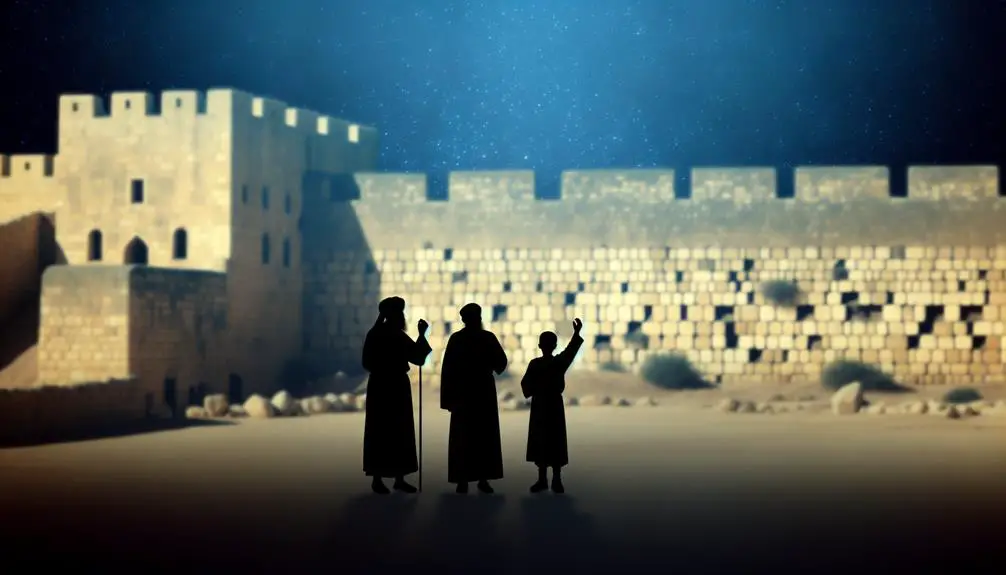
Throughout biblical history, the Patriarchs frequently interceded with God on behalf of Israel, demonstrating a profound commitment to their people and faith. This intercession highlights a unique relationship between the divine and the founders of the Israelite nation, marked by personal dialogue and negotiation.
Abraham's negotiations with God stand out as seminal moments of intercession. You'll recall the episode where Abraham negotiates over the fate of Sodom, passionately pleading for the city's salvation if righteous individuals can be found within it. This instance underscores not only Abraham's deep concern for human life but also his boldness in engaging with the divine, setting a precedent for prayer and intercession in the biblical narrative.
Isaac's blessings, on the other hand, illustrate a different aspect of patriarchal intercession. Through the act of blessing his sons, Isaac channels divine favor and outlines the future of the nation. His blessings are prophetic, shaping the destiny of Israel and reinforcing the covenantal relationship between God and His people. Isaac's actions underscore the power of spoken word as a form of intercession, where the patriarch's words have the capacity to invoke divine will and alter the course of history.
These early examples of intercession by the Patriarchs reveal a multifaceted approach to engaging with the divine. They combine negotiation, prayer, and the power of blessing to advocate for their people and influence their destiny. As such, they lay foundational principles for understanding prayer and intercession within the broader context of Israel's relationship with God.
Moses' Conversations With God

Moses' conversations with God, notably depicted in the Exodus narrative, mark a pivotal evolution in the practice of intercession and prayer within the biblical tradition. These dialogues, beginning with the iconic encounter at the burning bush, establish a foundational precedent for direct communication with the divine. Here, you observe Moses as he transitions from a reluctant shepherd to a leader, empowered by God's command and bolstered by miraculous signs intended to validate his divine mission.
The burning bush episode serves not only as a call to liberation but also as a model of intimate, conversational prayer. Moses' initial hesitance, met with patience and instruction from God, illustrates a dynamic of mutual engagement rather than unilateral decree. This interaction underscores the evolving nature of prayer from a simple act of homage or request to a complex dialogue with the divine, encompassing negotiation, supplication, and even protest.
Furthermore, the miraculous signs bestowed upon Moses, including his staff turning into a serpent and his hand becoming leprous and then healed, symbolize a tangible assurance of divine presence and support. These signs, while miraculous, also function pedagogically, teaching Moses and, by extension, the Israelites, about faith, obedience, and the power inherent in being chosen by God.
This evolution in the nature of prayer and intercession, as demonstrated through Moses' conversations with God, sets a precedent for subsequent biblical narratives. It establishes a framework within which prayer encompasses a broad spectrum of human-divine interaction, from awe and obedience to negotiation and personal transformation.
David's Psalms of Worship
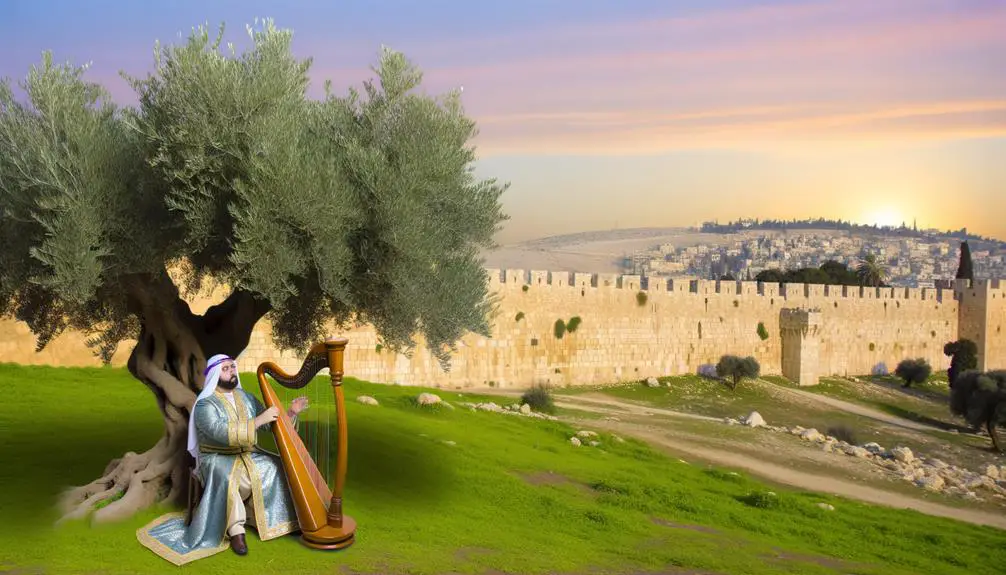
Building on the evolution of prayer and intercession demonstrated through Moses' dialogues with God, David's Psalms of Worship further enrich the biblical tradition of communicating with the divine. David, a shepherd, warrior, and king, introduced a deeply personal and poetic form of prayer, setting a precedent for heartfelt expressions of faith, gratitude, and supplication. His contributions aren't just textual; they're musical compositions that have shaped the way people of faith worship and connect with God for millennia.
David's psalms stand out because they encapsulate a range of human emotions, from the depths of despair to the heights of joy, offering a model for how to engage with the divine in all life's circumstances. Here are three key aspects that make David's Psalms of Worship particularly significant:
- Musicality: David's psalms were often set to music, suggesting that worship and prayer aren't confined to spoken words but can be expressed through the universal language of music.
- Authenticity: The psalms are marked by their genuine and heartfelt expressions, showing that communication with God can and should be deeply personal.
- Diversity of Themes: David's psalms cover a wide range of topics, from praise and thanksgiving to lament and plea for help, teaching that all aspects of life can be brought before God.
In analyzing David's Psalms of Worship, it's clear they not only provided a model for prayer and worship in their time but also set a timeless standard for engaging with the divine through heartfelt expressions and musical compositions.
Prophets' Pleas for Mercy
In the biblical narrative, prophets frequently issued pleas for mercy, embodying a profound theological shift towards seeking divine compassion and intervention in times of national distress. These intercessions, often marked by intense personal sacrifice and deep empathy for the people, underscore the prophets' role as intermediaries between the divine and the human realms. Particularly, Elijah's challenge and Jonah's reluctance serve as pivotal examples of this dynamic.
Prophet |
Context |
Significance |
|---|---|---|
Elijah |
Mount Carmel |
His challenge wasn't just a demonstration of God's power but a plea for divine mercy on a people misled into idolatry. |
Jonah |
Nineveh |
Jonah's reluctance to prophesy to Nineveh underscores the tension between divine justice and mercy, ultimately revealing God's compassionate nature. |
Moses |
Exodus |
His intercessions for Israel, especially after the Golden Calf incident, highlight the power of prayer in averting divine wrath. |
Samuel |
Israel's demand for a king |
Samuel's prayer reflects his deep concern for Israel's spiritual welfare, seeking mercy in their time of self-imposed peril. |
Isaiah |
Assyrian threat |
His prophecies and prayers for mercy during the Assyrian siege of Jerusalem highlight the role of faith and divine intervention in national survival. |
This table encapsulates the profound depth of the prophets' pleas for mercy, revealing not only their personal commitment to God's will but also their unwavering dedication to the people's spiritual and physical well-being. Through these narratives, the Bible presents a complex theology of mercy, where divine compassion often triumphs over judgment, mediated through the fervent prayers of the prophets.
Solomon's Dedication Prayer
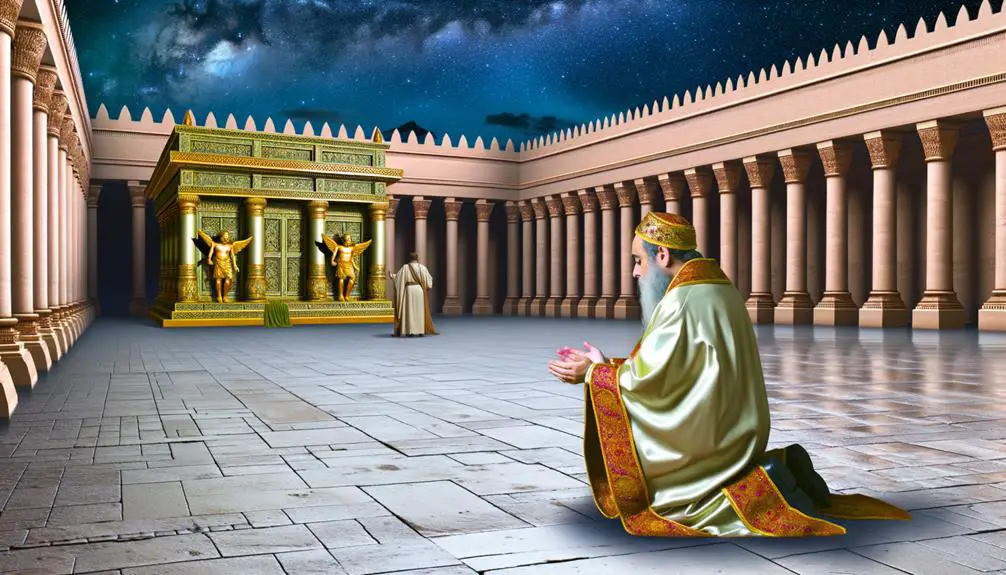
Reflecting on the prophets' pleas for mercy reveals a foundational aspect of biblical intercession, a theme that's further explored through Solomon's dedication prayer at the temple's inauguration. This pivotal moment in Israel's history, following the completion of the temple construction, underscores the significance of Divine presence within the community.
Solomon's prayer isn't merely a ceremonial utterance but a profound acknowledgment of God's sovereignty and faithfulness. He beseeches God to keep His promise that His Name would dwell in the temple, a physical manifestation of Divine presence among His people. This prayer encapsulates the essence of Israel's relationship with God, marked by a covenant that's both intimate and communal.
Several key elements in Solomon's prayer warrant closer examination:
- Acknowledgment of God's faithfulness: Solomon recalls God's steadfast love and the fulfillment of His promises, highlighting the continuity of Divine commitment across generations.
- Prayer for justice: He asks for God's intervention in matters of justice, demonstrating an understanding that the temple isn't only a place of worship but also a beacon of righteousness and ethical governance.
- Intercession for the nations: Interestingly, Solomon's prayer extends beyond Israel, inviting all peoples to recognize and worship the one true God. This inclusive vision reflects an early understanding of God's desire for a relationship with all of humanity, not just the Israelites.
Through Solomon's dedication prayer, one discerns the deep interplay between temple construction and Divine presence, revealing a theological framework that values both sacred space and divine proximity. This prayer not only consecrates the temple but also reaffirms the covenantal relationship between God and His people, setting a precedent for future generations.
Nehemiah's Cry for Restoration
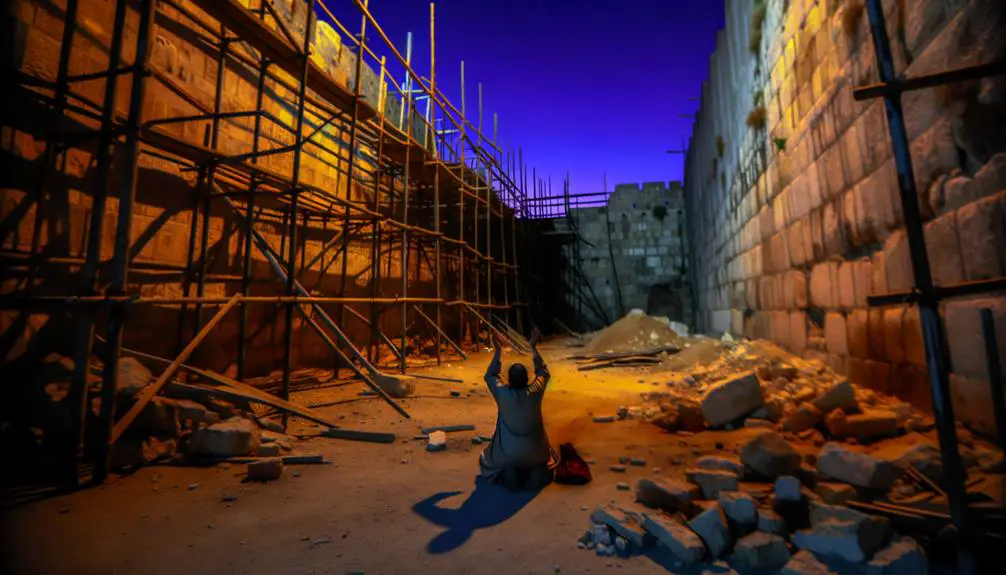
Amidst the ruins of Jerusalem, Nehemiah's heartfelt plea for the city's restoration represents a pivotal moment in biblical narratives of renewal and divine intervention. This episode, chronicled in the Book of Nehemiah, underscores the profound significance of prayer in mobilizing efforts towards rebuilding Jerusalem's walls. Nehemiah's cry isn't merely a request for physical reconstruction but embodies a deeper yearning for spiritual revival and communal restoration.
Analyzing Nehemiah's prayer, you observe its dual focus: it's both a confession of Israel's collective sins and a reminder of God's covenant promises. This strategic invocation of covenantal faithfulness underscores the intrinsic link between divine mercy and human agency in the rebuilding efforts. Nehemiah doesn't passively await divine intervention; instead, his prayer propels him into action, securing the king's favor for his mission.
Moreover, Nehemiah's approach to Jerusalem's restoration offers invaluable insights into effective leadership and faith-driven initiative. He meticulously assesses Jerusalem's walls, galvanizes support among the people, and confronts opposition with unwavering faith. This blend of practical wisdom, communal engagement, and spiritual dependence illustrates the multifaceted nature of biblical restoration narratives.
In essence, Nehemiah's cry for restoration transcends its historical context, offering timeless lessons on the power of prayer, the importance of community in rebuilding efforts, and the potential of faith to inspire transformative action. It reminds you that, in the face of desolation, renewal begins with a heartfelt plea for divine guidance and the willingness to act in faith.
Frequently Asked Questions
How Do Modern Interpretations of These Biblical Prayers Influence Contemporary Political Discussions About Israel?
You find that modern interpretations of these texts often shape debates around Israel, weaving in concerns about ecological stewardship and technological ethics. Analysts argue that these interpretations influence policy discussions, highlighting the need for sustainable development and ethical tech use in the region.
This scholarly analysis suggests that contemporary political dialogues aren't just about territorial claims, but also about how to responsibly manage resources and technology for a better future.
What Role Do These Prayers Play in Interfaith Dialogues, Especially Between Jewish, Christian, and Muslim Communities?
In interfaith dialogues, prayers play a pivotal role in fostering cultural empathy and understanding.
A 2020 study found that interfaith education, including shared prayer, increases positive attitudes between communities by 75%.
These prayers, especially from Jewish, Christian, and Muslim traditions, serve as common ground, encouraging participants to explore and respect diverse religious narratives.
They're essential in bridging gaps, promoting peace, and enhancing mutual respect across these faith communities.
Are There Any Archaeological Findings That Provide Evidence of the Historical Contexts of These Prayers?
You're likely wondering if there's tangible proof of the events or practices mentioned in ancient texts. Indeed, archaeologists have uncovered ancient inscriptions and ceremonial artifacts that hint at the historical contexts of these narratives.
These findings, ranging from stone etchings to ritual objects, provide a fascinating glimpse into the past, allowing us to piece together the practices and beliefs of ancient communities, thereby enriching our understanding of historical events and cultural traditions.
How Have These Prayers Been Adapted or Incorporated Into Modern Jewish and Christian Liturgies or Religious Practices?
You'd think prayers would stick to their script, but no, they've gone through a liturgical evolution, morphing and adapting to fit into modern Jewish and Christian practices.
It's not just about words anymore; musical adaptations have given these ancient prayers a fresh beat.
Analyzing this transition, it's clear that these adaptations aren't just remixes but a deeper integration of tradition and contemporary worship, showcasing a scholarly blend of history and modernity.
Can Psychological or Sociological Studies Shed Light on the Impact of These Prayers on Individual or Communal Resilience in the Face of Adversity?
You may find that psychological and sociological studies offer insights into the cognitive effects of prayer on resilience.
These studies can illuminate how communal prayers enhance social cohesion, helping individuals and communities withstand adversity.
Conclusion
In sum, the tapestry of prayers for Israel within the Bible is rich and multifaceted, weaving through the epochs from the patriarchs to the prophets. These prayers, from Moses' intimate dialogues to David's lyrical psalms, embody a mosaic of fervent hope and divine intercession.
Solomon's earnest supplication and Nehemiah's passionate appeal underscore a collective yearning for divine guidance and restoration. Indeed, like a beacon in the night, these prayers illuminate the enduring bond between the divine and His chosen people, offering profound insights into the spiritual landscape of biblical Israel.



Sign up